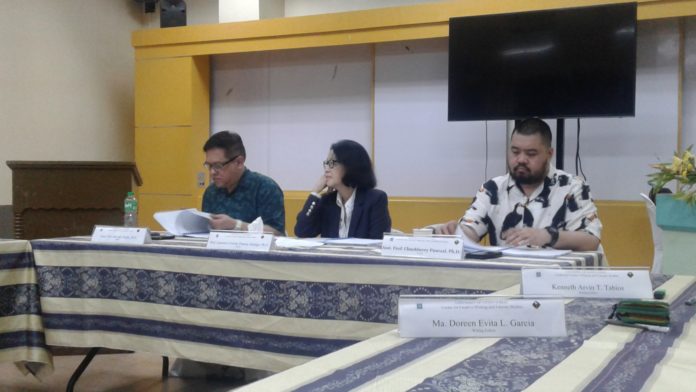
ALTHOUGH the “hugot” have come a long way in pleasing the Filipino readers, a creative writer should do away with it and develop a broader sensibility in writing.
This was the challenge of the country’s esteemed writers and literary scholars to the 16 fellows of the Fourth Thomasian Undergraduate Writers’ Workshop held last June 7 to 9 at the Rizal Hall of St. Raymund’s Building, hosted by the Center for Creative Writing and Literary Studies (CCWLS).
As part of its literary endeavor, this year’s writing workshop addressed not only the fellow’s writing know-hows but also the issue of cliché love subjects in writing.
The word “hugot,” roughly translated as “pull out” or “draw” in English, refers to expressions with sentimental undertones “pulled out” and “drawn” from someone’s personal experiences in life, usually about love.
While it may be commonly seen in social media posts , established writers have long used hugot in their literary works.
Panelists directly criticized young writers, who are confined to typical romance narratives which target readers who are having the same sentiments with them.
Ned Parfan, CCWLS fellow, urged aspiring writers to write about their own unique experiences as an effective way of keeping one’s work compelling, instead of persisting in hugot subjects just to make their works crowd-pleasing.
“Tanggalin mo ang lahat ng narinig na namin noon,” he said. “Gawin mong specific sa experience mo ang sinusulat mo para maging interesting. Kung gagawin mong specific, lahat ito ay magiging maayos,” he added.
Joselito de los Reyes, award-winning author and one of the workshop coordinators, encouraged writers to discover and present their readers a unique story when writing about love.
“Marami na ang natula tungkol sa pag-ibig and that makes it more difficult for you to think of something na panibago,” he said. “Pero iyon nga e, creative writers tayo at nagtatangka tayong lumikha ng bago.”
“Sigurado akong hindi lang ganito kapayak ang sensibilidad sa pagmamahal. Ano ba ang biggest longing mo na hindi pa nila naranasan, pangkaraniwan pero hindi pa nila narinig?” he added.
Jerry Gracio, screenplay writer, said that while writing about one’s “love life” is alright for beginning writers, they should eventually “level up” and offer a new perspective about life.
“When you get older at puro hugot at pag-ibig ka pa rin, hahanapan na kita ng ibang insight bilang mambabasa,” he said.
Good writing
Cristina Pantoja Hidalgo, CCWLS director, advised the workshop participants to improve their craft by reading the best works in their genre.
“How do you learn to sing well and improve? You listen to the ones who do it well and learn from them. You do the same for writing,” she said.
John Jack Wigley, former UST Publishing House director, emphasized the relevance of an outline as part of one’s preparation in writing a literary piece.
“Nakatutulong siguro ang outline for writing para nakikita ‘yong progress ng kuwento. Hindi mo kasi masyado makikita ang kabuuan ng kuwento kung walang outline,” he said.
De los Reyes also discussed the important role of research in the writing process.
“May malaking component ang research sa pagiging creative writer. Hindi lamang tayo basta humuhugot ng salita sa alapaap,” he said.
Other panelists were Publishing House director Ailil Alvarez, CCWLS fellows Ralph Galan and Chuckberry Pascual, poet Joel Toledo and University of the Philippines-Diliman professor Joey Baquiran.
Author Dawn Marfil served as one of the workshop coordinators alongside de los Reyes.
Writing is for everyone
Although they consider writing as a “completely different world” in their field of expertise, eight non-Literature students also proved that their fellowship in the workshop was still a worth shot.
The fellows from different degree programs were: Elaine Joyce Ang (BS Medical Technology), Carl Keith Leal (BS Architecture), Moses Matsuzawa (BS Hotel and Restaurant Management), May Siglos (BS Accountancy), Kim Alwin Sy (BS Education, major in English), Kenneth Arvin Tabios (BS Civil Engineering), Kevin Glenn Yee (BS Civil Engineering) and Zymon Arvindale Dykee (AB Journalism).
“It is a bit disheartening to join this workshop at first, being a non-Literature major […], but TUWW had ignited my hope to be a better writer once again, knowing that regardless of your program, anyone who has the zeal and perseverance to write can write meaningfully,” Ang said in an interview with the Varsitarian.
Tabios, who recently graduated after the announcement of fellows, said the degree programs have no bearing when joining a writing workshop.
“Kahit hindi ka [Literature] major, basta alam mo sa sarili mo na passion mo naman talaga, makasasabay ka sa diskusyon. Ang kailangan mo lang naman talaga ay makinig at maging open sa criticisms,” he said.
Fellows who are Literature students were: Arielle Abrigo, Leanne Claire Bellen, Francis Agapitus Braganza, Ma. Doreen Evita Garcia, Nikko Miguel Garcia, Philip Jamilla, Marianne Ella Lao, Lloyd Alcedric Opalec and Neal Andreu Tayco.
During the application period, fellows were required to submit a manuscript which may be one short story, one work of creative nonfiction, one one-act play or two poems, written either in English or Filipino.
The workshop aims to discover and nurture budding writers belonging to different colleges. It also serves as a “wake-up call” for them to join more prestigious writing workshops outside the University and motivate them to submit literary works to different publications and literary contests.













